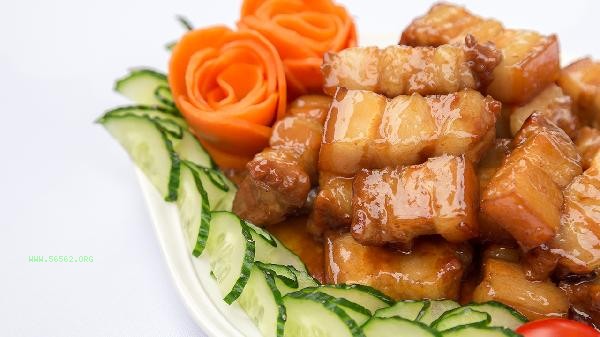The fastest and most effective way to remove the fishy smell from pork is to soak it in clean water and then blanch it with ginger slices, cooking wine, or white vinegar. The key steps for removing fishy smell include blood cleaning, neutralization of acidic substances, high-temperature deodorization, masking with spices, and pre-treatment techniques.

1. Blood cleaning
The residual blood on the surface and muscle fibers of fresh pork is the main source of fishy smell. Cut the pork into chunks and soak it in clean water for half an hour. Change the water two to three times during this time until the color of the water becomes clear. Soaking in cold water can promote the dissolution of myosin, and gentle rubbing can enhance the deodorization effect. Note that the water temperature should not exceed 15 degrees Celsius to avoid protein denaturation and lock in the fishy smell.
2. Neutralization of acidic substances
Using seasonings containing organic acids can decompose fishy substances. When blanching, add 20 milliliters of cooking wine or 1 tablespoon of white vinegar. Acidic environment can cause the volatilization of fishy amine substances. Lemon juice or dried hawthorn also have a similar effect, but the amount should be controlled to avoid the meat becoming stale. Acidic substances can also soften meat texture, making them particularly suitable for processing aged pork.
3. High temperature deodorization
Boiling water can promote the evaporation of fishy substances. Heat cold water in a pot until boiling, skim off any foam, and continue boiling for 2 minutes. High temperature causes hemoglobin to coagulate and precipitate, while also destroying the precursor substances of fishy odor. Immediately rinse with warm water after blanching to avoid residual fishy substances on the meat surface. Note that blanching for too long can cause loss of freshness.

4. Spice masking
Spices such as star anise and cinnamon contain volatile aromatic oils that can mask residual fishy odors. When stewing, add 3-5 Sichuan peppercorns or 1 grass fruit, which contain terpenes that can combine with fishy substances. Fresh scallions and cilantro contain sulfur-containing compounds, which also have a deodorizing effect and are suitable for sprinkling on stir fried dishes at the end.
5. Preprocessing Techniques
Cutting meat with reverse lines can break down the muscle fiber structure and help remove fishy odors. A thickness of 0.5 centimeters is recommended. Beating the meat slices with the back of the knife can loosen the meat and promote the leakage of blood. Adding a small amount of baking soda during pickling can change the protein structure, but the amount should be controlled within 0.3% of the meat weight, as excessive amounts can produce an alkaline taste.

Processed pork is recommended to be cooked on the same day and refrigerated for no more than 24 hours. Paired with sulfur-containing vegetables such as white radish and onions can further reduce the fishy smell. The degree of fishy smell varies greatly in different parts, and internal organs such as pig liver need to be soaked for an additional hour. Special groups such as pregnant women are recommended to extend the blanching time to 5 minutes before consumption to ensure food safety. Pay attention to the combination of meat and vegetables in daily cooking, and consume in moderation to ensure balanced nutrition.









Comments (0)
Leave a Comment
No comments yet
Be the first to share your thoughts!